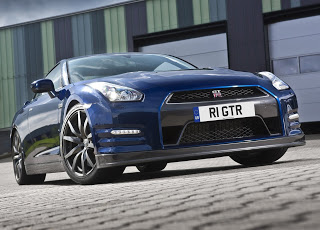
 |
| 2011 Nissan GT-R |
The history began when Nissan came with the Datsun 120Y which won almost every race at its disposal. Later on the Datsun was replaced with Skyline, a more robust version. However its life was short and by late 90’s the Skyline GT-R waved goodbye to the motoring industry.
 |
| Sharper and more appealing than before |
One year after marking the new millennium, Nissan brought it back to life but they only retained the initials GT-R. People thought that this was another concept that will never make it to production. In 2005 however, the GT-R Proto was launched marking the beginning of its life. Two years later the world was graced with the final work of the engineers’ hard work.
 |
| Redesigned rear with low stop light |
The new GT-R was praised all over the world thanks to its amazing speeds and handling capabilities. The engineers had not finished with it yet. They took it back an added a few touches and the result is probably the best GT-R ever!
 |
| Side view |
They replaced the old four wheel drive system with a new one that uses a transaxle 4WD. No car in the world has ever used this system before. Special computers aid it in distribution of power to each of the GT-R nitrogen filled hooves. This married to the car’s race tuned suspension has the ability to offer excellent handling even at speeds of over 300km/h.
 |
| GT-R spec V |
Under the bonnet is a 3.8 litre twin turbocharged V6 that coughs out 520 bhp. This makes it one of the most powerful cars Nissan has ever produced. Married to the engine is a six speed transmission system that has been specially designed for it. As it is a Japanese machine its transmission is more complicated than a science formula.
 |
| Its rear design |
It has two selectable modes, M or manual mode where paddle shift gives exceedingly quick changes maintaining the turbo boost. The result you will be overtaking other cars faster thanks to its strong powerful burst. If you want to tame a loud Subaru that cant keep of your rear view mirror, I suggest the R or race mode. Here you let the car do the work for you. The car engages the gears faster than you can blink you eyes. Before long the Subaru will be nothing but a small spec in the rear view mirror.
 |
| GT-R together with its faster sister the V spec |
The new Nissan GT-R is a muscular, distinctive looking car. It’s chunky, edgy, wide shouldered, ground-hugging and flat-sided. If the body was a sermon it will be the heading, the fundamentals of aerodynamics. Every aspect of the body has been engineered to make it as agile as possible on the roads. However most of it exterior features have been borrowed from great Nissans of the past, include the edgy boxy shape of the PGC10 GT-R of 1969, the four round tail lamps of the KPGC110 GT-R of 1973 and the long thin slit grille opening of the R34 GT-R of 1999.
 |
| Bose sound system at the back |
Like it amazing exterior the interior is stylish but highly functional. Instruments are large, clear and simple, all directly in front of the driver for maximum legibility.
 |
| Multifunctional display |
As usual there is a multi-function display in the centre of the dash, that not only gives you a detailed log of your driving behaviour, speed, g-force, fuel economy etc, but also gives details of the car’s mechanical information, turbo boost, water and engine oil pressure, transmission oil, front/rear drive distribution plus steering angles, braking and acceleration pressure, and also optimal gearshift mapping for best fuel economy. It also acts as the DVD/Radio entertainment unit. One can order a GT-R with Bose Sound systems that include a powerful subwoofer and ten speakers.
 |
| Cockpit |
The driver’s seat is designed so that anyone from 144cm-190cm will feel comfortable behind the wheel. The seat slide is long (228mm), the seat is height and rake-adjustable and the steering wheel also has a wide range of adjustments (60mm tilt, 60mm telescopic), the better to allow almost all drivers to find the perfect driving position.
 |
| Multifunctional steering wheel |
Like many high-performance four-seat coupes, the rear seats are more ‘occasional’ seats than full-size chairs. Though perfectly comfortable for most adults on short journeys, they are better for children or for carrying bags, jackets and other goods. The centre console sweeps through the middle of the cabin, dividing left and right rear seats. The seat has three colour schemes: black, black with red highlight or grey.
